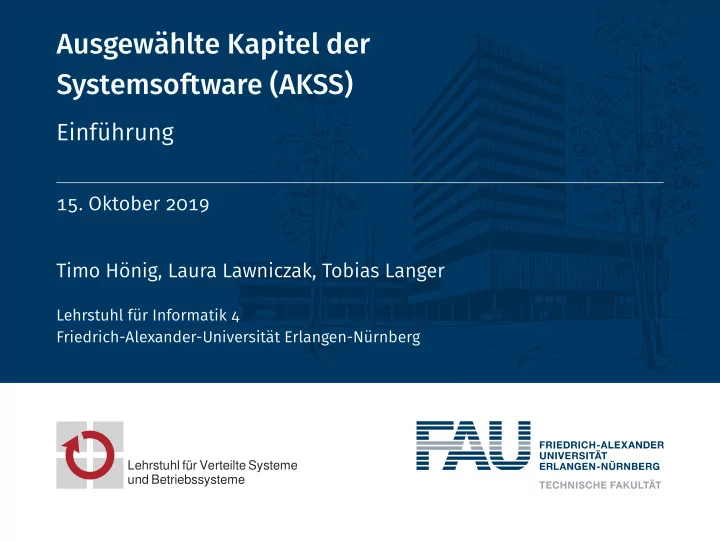

Ausgewählte Kapitel der Systemsoftware (AKSS) Einführung 15. Oktober 2019 Timo Hönig, Laura Lawniczak, Tobias Langer Lehrstuhl für Informatik 4 Friedrich-Alexander-Universität Erlangen-Nürnberg Lehrstuhl für Verteilte Systeme und Betriebssysteme
Organisatorisches
Überblick Dr. Timo Hönig (Raum 0.050) thoenig@cs.fau.de Laura Lawniczak (Raum 0.041) lawniczak@cs.fau.de Tobias Langer (Raum 0.041) langer@cs.fau.de Termin: Dienstag, 16:15-17:45, Raum 0.035 Webseite: www4.cs.fau.de/Lehre/WS19/MS_AKSS/ Anmeldung via Waffel Mailingliste an alle Teilnehmer & Betreuer akss@lists.informatik.uni-erlangen.de 1
Modus (1) Einarbeitung Eigenständiges Bearbeiten eines Themas Literaturrecherche: Zwei Papiere als Ausgangsbasis Suchen eines Fokuspapiers zum Thema Ausarbeitung Erstellen einer Ausarbeitung (mind. 6 Seiten) ACM Standard Proceedings Template (ACM SGI style) Berücksichtigen der Wissensbasis Sprache: Deutsch oder Englisch 2
Modus (2) Vortrag Foliensatz zur Ausarbeitung Optional: i4-Beamertemplate ( Beamer / neo ) Berücksichtigen der Hinweise zur Erstellung der Folien Sprache: Deutsch oder Englisch Vortrag im Rahmen des Seminars 20-minütiger Vortrag 10-minütige Diskussion zum Vortrag 15-minütige Diskussion zum Fokuspapier 3
Zeitlicher Ablauf Auswahl des Fokuspapiers Bis zum 5.11. 2019 Erste Version der Ausarbeitung Drei Wochen vor der Präsentation Feedback von Betreuer Erste Version der Folien Zwei Wochen vor der Präsentation Feedback von Betreuer Finale Version der Folien Freitag vor der Präsentation Betreuer verteilt die Ausarbeitung über die Mailingliste 4
Zusätzliche Informationen Arbeitsmittel Verwendung von Git empfohlen Abgabe der Ausarbeitung/Folien per Git (oder E-Mail) Organisation Beim Seminar gilt Anwesenheitspflicht: Bei Abwesenheit bitte (per E-Mail) Bescheid geben Technikcheck rechtzeitig vor der Präsentation Veröffentlichung der (finalen) Folien und Ausarbeitung auf der Seminarwebseite (Falls nicht gewünscht, bitte Bescheid geben) 5 → https://gitlab.cs.fau.de/
Themen
Byte-addressable NVRAM (reserviert) Benjamin Ransford und Brandon Lucia. “Nonvolatile me- mory is a broken time machine”. In: Proceedings of the workshop on Memory Systems Performance and Correct- ness (MSPC ’14) . 2014, 5:1–5:3 Katelin Bailey u. a. “Operating System Implications of Fast, Cheap, Non-Volatile Memory”. In: Proceedings of the 13th USENIX Conference on Hot Topics in Operating Sys- tems (HotOS’13) . 2011, S. 2–2 6
NVM-based File Systems Qingda Hu u. a. “Log-Structured Non-Volatile Main Me- mory”. In: Proceedings of the 2017 USENIX Annual Tech- nical Conference (ATC ’17) . 2017, S. 703–707 Jian Xu u. a. “NOVA-Fortis: A Fault-Tolerant Non-Volatile Main Memory File System”. In: Proceedings of the 26th Symposium on Operating Systems Principles (SOSP ’17) . 2017, S. 478–496 7
Kernel Bypassing Irene Zhang u. a. “I’m Not Dead Yet!: The Role of the Ope- rating System in a Kernel-Bypass Era”. In: Proceedings of the Workshop on Hot Topics in Operating Systems (HotOS ’19) . 2019, S. 73–80 Swapnil Haria, Mark D. Hill und Michael M. Swift. “De- virtualizing Memory in Heterogeneous Systems”. In: Pro- ceedings of the Twenty-Third International Conference on Architectural Support for Programming Languages and Operating Systems (ASPLOS ’18) . 2018, S. 637–650 8
Virtual Memory Organization (reserviert) Simon Gerber u. a. “Not your parents’ physical address space”. In: 15th Workshop on Hot Topics in Operating Sys- tems (HotOS ’15) . 2015 Izzat El Hajj u. a. “SpaceJMP: Programming with Multiple Virtual Address Spaces”. In: Proceedings of the Twenty- First International Conference on Architectural Support for Programming Languages and Operating Systems (AS- PLOS ’16) . 2016, S. 353–368 9
RDMA-based Storage Systems (reserviert) Aleksandar Dragojević u. a. “FaRM: Fast Remote Memo- ry”. In: Proceedings of the 11th Symposium on Networ- ked Systems Design and Implementation (NSDI ’14) . 2014, S. 401–414 Yacine Taleb u. a. “Tailwind: Fast and Atomic RDMA-based Replication”. In: Proceedings of the 2018 USENIX Annual Technical Conference (ATC ’18) . 2018, S. 851–863 10
Distributed Memory Management (reserviert) Stephen M. Rumble, Ankita Kejriwal und John Ouster- hout. “Log-structured Memory for DRAM-based Storage”. In: Proceedings of the 12th USENIX Conference on File and Storage Technologies (FAST ’14) . 2014, S. 1–16 Sudarsun Kannan u. a. “HeteroOS: OS Design for Hete- rogeneous Memory Management in Datacenter”. In: Pro- ceedings of the 44th Annual International Symposium on Computer Architecture (ISCA ’17) . 2017, S. 521–534 11
File System Aging Saurabh Kadekodi u. a. “Geriatrix: Aging what you see and what you don’t see”. In: Proceedings of the 2018 USENIX Annual Technical Conference (ATC ’18) . 2018, S. 691–703 Alex Conway u. a. “File Systems Fated for Senescence? Nonsense, Says Science!” In: Proceedings of the 15th Use- nix Conference on File and Storage Technologies (FAST ’17) . 2017, S. 45–58 12
NAND Flash Memory Garbage Collection Qi Zhang u. a. “Lazy-RTGC: A Real-Time Lazy Garbage Collection Mechanism with Jointly Optimizing Average and Worst Performance for NAND Flash Memory Storage Systems”. In: ACM Trans. Des. Autom. Electron. Syst. 20.3 (2015), 43:1–43:32 Wonkyung Kang, Dongkun Shin und Sungjoo Yoo. “Rein- forcement Learning-Assisted Garbage Collection to Mi- tigate Long-Tail Latency in SSD”. In: ACM Trans. Embed. Comput. Syst. 16.5 (2017), 134:1–134:20 13
Themenvergabe Themen werden nach Windhundverfahren vergeben Eigene Themenvorschläge willkommen Termin für Präsentation kann selbst gewählt werden (Maximal zwei Präsentationen pro Termin) 14
Recommend
More recommend